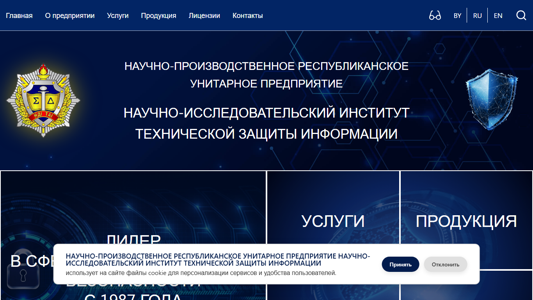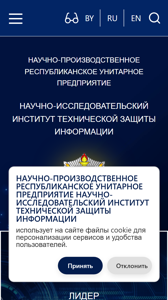 Главная
Главная
| УНП | 100036784 |
|---|---|
| Название / Заголовок | Главная |
| Телефон | +375173223186, +375232207736, +375173028171, +375232283265 |
| info@niitzi.by | |
| Адрес | ИНФОРМАЦИИ, Офисы и подразделения, Контактные данные, Текущее местоположение, Юридический адрес, г. Минск, ул. Первомайская, 26, корпус |
| Обновлено | 2026-01-05 22:16:15.714645+00 |
| IP адрес | 195.50.20.205 |
| Проверка IP | 2025-11-28 23:11:11.391341+00 |
| Viewport | width=device-width, initial-scale=1.0 |
| SEO-описание | Профессиональная защита информации: аудит безопасности, внедрение систем защиты и мониторинг. Широкий выбор средств технической защиты информации. Доверьтесь экспертам в области информационной безопасности. |
| AI-анализ | The website is for the National Research Scientific and Technical Enterprise "NIITZI" in Belarus, which provides information security audit, implementation of protective systems, and monitoring services. It offers a wide range of information security solutions. The website uses cookies for service personalization and user convenience. The contact details include the address, phone number, and email address of the enterprise located in Minsk. The website also provides information on the company's offices and subsidiaries in other locations, as well as bank account details. |
| SEO-лексика | 375 предприятие беларусь минск 302 info niitzi научно-производственное республиканское унитарное научно-исследовательский институт технической защиты информации cookie 322 республики политика обработки |
| Безопасность | hsts: ❌, csp: ❌, x_frame: ❌, x_content_type: ❌, re...hsts: ❌, csp: ❌, x_frame: ❌, x_content_type: ❌, referrer_policy: ❌ |
| Доступность | basic: {"missing_alts":1,"empty_links":1}, extende...basic: {"missing_alts":1,"empty_links":1}, extended: {"missing_alts":1,"empty_links":1,"aria_attributes":1} |
| Технологии сайта | Yandex Metrika |
| SSL до | 2026-12-07 |
| Дней до SSL | 335 |
| Кодировка | utf-8 |
| AI-качество | -1 |
| Флаги | {encoding:utf-8} |
| Robots.txt | Открыть robots.txt<!DOCTYPE html>
<html lang="ru">
<head>
<meta charset="UTF-8" />
<meta name="viewport" content="width=device-width, initial-scale=1.0" />
<title>СÑÑаниÑа в ÑазÑабоÑке</title>
<style>
:root {
--color-primary-500: #021c4d;
--color-primary-300: #0b40a1;
--color-primary-100: #5f94f7;
--color-dark-700: #1e1e1e;
--background-light: #f9f9f9;
--text-color-light: # |
| Sitemap | ❌ Нет |
| QR / Короткая ссылка |  niti.by/20XE |

